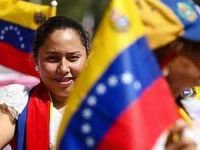Venezuela’s Great Patriotic Pole
By Olivia Kroth

Sources: Blog Hugo Chávez, Correo del Orinoco, Patria Grande, Radio Nacional de Venezuela, Venezuelanalysis
The Great Patriotic Pole, Gran Polo Patriotico (GPP), is a grassroots movement in which individuals, organizations of various kinds and social movements have joined to help President Hugo Chávez win this year's presidential elections again, due on the 7th of October.
"Get ready, all you Christian, humanist, nationalist, patriotic, political and social movements," Hugo Chávez said in his open invitation to all Venezuelan citizens.
The governing United Socialist Party of Venezuela (PSUV), with 7 million members, is the majority force of the Great Patriotic Pole, yet membership is based on conditions of equality. It is not organized from top down but surges from the roots, the base.
The Great Patriotic Pole is not new. It was formed in 1998, and secured 120 of 131 seats in Venezuela's Constitutional Assembly. Furthermore, it helped to develop the Constitution of the Bolivarian Republic in 1999.
Thus it is an important political instrument for President Chávez and PSUV, having shown its long-term validity as a broad-based and strong coalition of democratic, nationalist, socialist and anti-imperialist forces in the Latin American country.
The Great Patriotic Pole is the flagship of Venezuela's "Socialism for the 21st Century." Smaller parties and the Communist Party of Venezuela (PCV) have joined in. PCV leader, Oscar Figuera, declared that Hugo Chávez is their chosen presidential candidate for October 2012 and will get the Communist Party's full support.
Many communal councils from all the regions of Venezuela are part of the Great Patriotic Pole. In these horizontally structured instances of integration and participation, people can manage their public policies directly, according to the principles of equity and social justice.
Many cooperatives have become members of the Great Patriotic Pole as well. They are autonomous associations with jointly-owned, democratically controlled enterprises of various sorts.
When President Hugo Chávez took office in 1999, Venezuela had 762 cooperatives, with 20,000 members. In 2005, there were already 62,880 cooperatives with 873,000 members. The numbers keep growing.
In February 2012, the Great Patriotic Pole united 33,000 different movements. Venezuela's indigenous communities are valued members, just like feminist associations and student organizations.
Daniela Hinojosa, a member of the "Feminist Spider Collective" (Colectivo Arana Feminista) said in an interview on Venezolana de Televisión (VTV) that the Great Patriotic Pole is giving women's associations a greater chance of being heard and seen in the media. They can take a greater space in the nation's life.
Venezuela's feminist associations support President Chávez' initiative of a law that guarantees women the right to live a life free of violence (Ley Orgánica sobre el derecho a las mujeres a una vida libre de violencia).
The feminist women are also proposing a law that will guarantee a post-natal maternity leave from 6 to 12 months. Another aim is for housewives to receive social security and a pension after 60.
Venezuela's Minister for Youth, Mari Pili Hernández, announced in April that more than 2 million young people have joined the grassroots movement, forming the Great Patriotic Pole for Youth, Gran Polo Patriotico Juvenil (GPPJ). "We must be united," the Minister said. "Unity will secure the future of our homeland."
Furthermore, Venezuela's student organizations have formed a Great Patriotic Student Pole, Gran Polo Patriotico Estudiantil.
In the state of Miranda and the Capital District, students from the Bolivarian University of Venezuela (UBV), the National Experimental Polytechnic University (Unexpo), the National Experimental University Simón Rodríguez and the Experimental Polytechnic University Libertador, are the core of the students' Patriotic Pole.
Ivann Pérez, a medical student in his second year at UBV, said that the students are the most combatitive and innovatory sector of the revolution. "We represent the impetus and the future of our nation. It is important for us to integrate into the GPP to secure and guarantee victory."
Endy Herrera, a student of Industrial Engineering in his fourth semester at Unexpo, pointed out that the GPP gives students "an open space which allows us to discuss proposals for advancement and adjustment of the revolution. It is an open space where we will be heard".
The Venezuelan Government hopes that the GPP will transcend national borders to join an international popular pole, in solidarity with other global movements fighting capitalism and imperialism.
A better world is possible. Venezuela is well on its way to consolidate the construction of a different reality with the help of its Great Patriotic Pole.
Prepared for publication by:
Lisa Karpova
Pravda.Ru
Subscribe to Pravda.Ru Telegram channel, Facebook, RSS!


